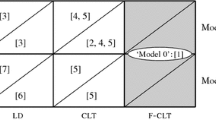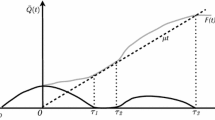Abstract
We consider a model in which the production of new molecules in a chemical reaction network occurs in a seemingly stochastic fashion, and can be modeled as a Poisson process with a varying arrival rate: the rate is λ i when an external Markov process J(⋅) is in state i. It is assumed that molecules decay after an exponential time with mean μ −1. The goal of this work is to analyze the distributional properties of the number of molecules in the system, under a specific time-scaling. In this scaling, the background process is sped up by a factor N α, for some α>0, whereas the arrival rates become N λ i , for N large. The main result of this paper is a functional central limit theorem (F-CLT) for the number of molecules, in that, after centering and scaling, it converges to an Ornstein-Uhlenbeck process. An interesting dichotomy is observed: (i) if α > 1 the background process jumps faster than the arrival process, and consequently the arrival process behaves essentially as a (homogeneous) Poisson process, so that the scaling in the F-CLT is the usual \(\sqrt {N}\), whereas (ii) for α≤1 the background process is relatively slow, and the scaling in the F-CLT is N 1−α/2. In the latter regime, the parameters of the limiting Ornstein-Uhlenbeck process contain the deviation matrix associated with the background process J(⋅).
Similar content being viewed by others
References
Anderson D, Kurtz T (2011) Continuous-time Markov chain models for chemical reaction networks. In: Koeppl H, et al. (eds)Design and analysis of biomolecular circuits: engineering approaches to systems and synthetic biology. Springer, New York, pp 3–42
Arazia A, Ben-Jacob E, Yechiali U (2004) Bridging genetic networks and queueing theory. Physica A 332:585–616
Asmussen S (2003) Applied probability and queues, 2nd edn. Springer, New York
Ball K, Kurtz T, Popovic L, Rempala G (2006) Asymptotic analysis of multi-scale approximations to reaction networks. Ann Appl Probab 16:1925–1961
Bhattacharya R N (1982) On the functional central limit theorem and the law of the iterated logarithm for Markov processes. Z. Wahrscheinlichkeitstheorie verw. Gebiete 60:185–201
Blom J, de Turck K, Mandjes M (2013a) A central limit theorem for Markov-modulated infinite-server queues. In: Proceedings ASMTA 2013, Ghent, Belgium. Lecture notes in computer science (LNCS) series, vol 7984, pp 81–95
Blom J, Kella O, Mandjes M, Thorsdottir H (2013b) Markov-modulated infinite-server queues with general service times. To appear in Queueing Systems (available online)
Blom J, Mandjes M, Thorsdottir H (2013) Time-scaling limits for markov-modulated infinite-server queues. Stoch Models 29:112–127
Borovkov A (1967) On limit laws for service processes in multi-channel systems. Siberian Math J 8:746–763
Cookson N, Mather W, Danino T, Mondragón-Palomino O, Williams R, Tsimring L, Hasty J (2011) Queueing up for enzymatic processing: Correlated signaling through coupled degradation. Mol Syst Biol 7(561):1
Coolen-Schrijner P, van Doorn E (2002) The deviation matrix of a continuous-time Markov chain. Probab Eng Inform Sci 16:351–366
D’Auria B (2008) M/M/∞ queues in semi-markovian random environment. Queueing Syst 58:221–237
Eick S, Massey W, Whitt W (1993) The physics of the M t /G/∞ queue. Oper Res 41:731–742
Ethier S, Kurtz T (1986) Markov processes: characterization and convergence. Wiley
Fralix B, Adan I (2009) An infinite-server queue influenced by a semi-Markovian environment. Queueing Syst 61:65–84
Gillespie D (2007) Stochastic simulation of chemical kinetics. Annu Rev Phys Chem 58:35–55
Iglehart D (1965) Limiting diffusion approximations for the many server queue and the repairman problem. J Appl Probab 2:429–441
Jacod J, Shiryayev A (1987) Limit theorems for stochastic processes. Springer, Berlin
Kang H, Kurtz T (2013) Separation of time-scales and model reduction for stochastic reaction networks. Ann Appl Probab 23:529–583
Keilson J, Servi L (1993) The matrix M/M/\(\infty \) system: retrial models and Markov modulated sources. Adv Appl Probab 25: 453–471
Kurtz T, Protter P (1991) Wong-zakai corrections, random evolutions, and simulation schemes for SDEs. In: Mayer-Wolf E, Merzbach E, Schwartz A (eds)Stochastic aAnalysis. Academic Press, pp 331–346
O’Cinneide C, Purdue P (1986) The M/M/∞ queue in a random environment. J Appl Probab 23:175–184
Rebolledo R (1980) Central limit theorems for local martingales. Z. Wahrscheinlichkeitstheorie verw. Gebiete 51:269–286
Robert Ph. (2003) Stochastic networks and queues. Springer, Berlin
Schwabe A, Rybakova K, Bruggeman F (2012) Transcription stochasticity of complex gene regulation models. Biophys J 103:1152–1161
Whitt W (2007) Proofs of the martingale FCLT. Probab Surv 4:268–302
Author information
Authors and Affiliations
Corresponding author
Additional information
Work partially done while D. Anderson was visiting CWI and KdVI, and K. de Turck was visiting KdVI; financial support from NWO cluster STAR (Anderson) and Fonds Wetenschappelijk Onderzoek / Research Foundation – Flanders (De Turck) is greatly appreciated. Anderson was also supported under NSF grant DMS-100975 and DMS-1318832.
M. Mandjes is also with EURANDOM, Eindhoven University of Technology, Eindhoven, the Netherlands, and IBIS, Faculty of Economics and Business, University of Amsterdam, Amsterdam, the Netherlands.
Rights and permissions
About this article
Cite this article
Anderson, D., Blom, J., Mandjes, M. et al. A Functional Central Limit Theorem for a Markov-Modulated Infinite-Server Queue. Methodol Comput Appl Probab 18, 153–168 (2016). https://doi.org/10.1007/s11009-014-9405-8
Received:
Accepted:
Published:
Issue Date:
DOI: https://doi.org/10.1007/s11009-014-9405-8




